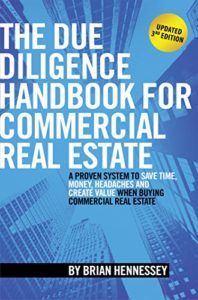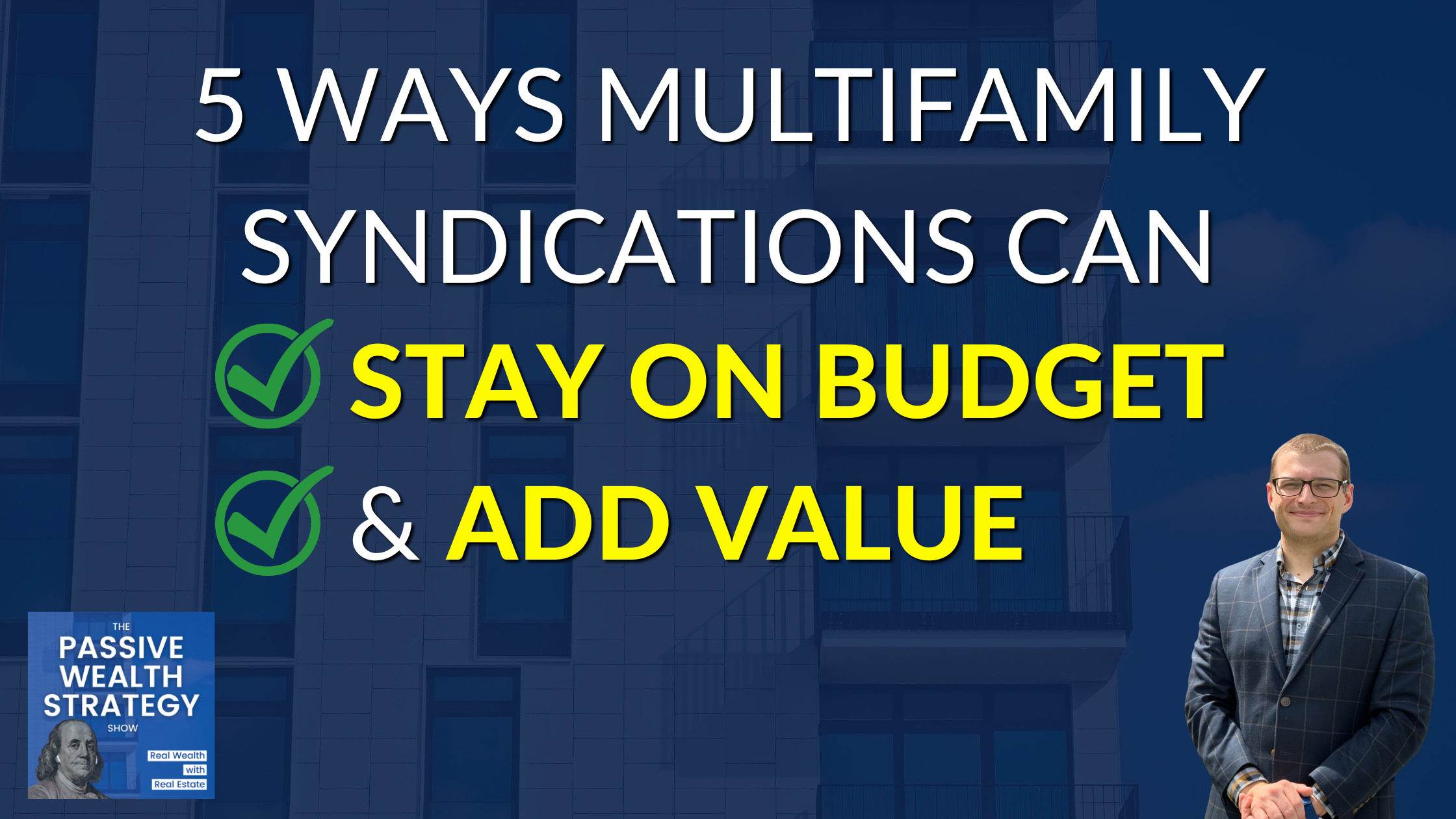Real estate is supposed to be a very productive aspect of earning cash. Brian Hennessey, the SVP at Avison Young, shares his advice as to why a passive investor needs to be knowledgeable at due diligence in deals. Brian is a 30+ year commercial real estate veteran who has managed every aspect of the real estate transaction. He is the author of a number one best-selling book on Amazon, The Due Diligence Handbook for Commercial Real Estate, and The How to Add Value Handbook for Commercial Real Estate. Brian notes the importance of due diligence and the need to “know what you don’t know” before it’s too late. He also talks about some of the more off-the-wall unexpected things that new investors don’t see coming and shares his opinion on the cashflow investment opportunity when investing in hotels.
—
Don’t Lose Money when You Buy Real Estate with Brian Hennessey

Our guest is Brian Hennessey. He is the author of a number one best-selling book on Amazon, The Due Diligence Handbook for Commercial Real Estate and The How to Add Value Handbook for Commercial Real Estate, both of which can be found on Amazon. He has been brokering, investing and generally involved in real estate for many years. He shares his knowledge so you can learn from his experience. He also offers an online course to help those struggling or wanting to learn more about real estate and what it has to offer. That’s called The Due Diligence Video Course, which can be found at Courses.ImpactCoachingSystems.com. Brian, welcome to the show. Could you tell us a little bit about why we, as passive investors, need to get good at due diligence in deals, maybe when you were just investing alongside an experienced syndicator?
I’ll give you a little context to put it in perspective. I had been a commercial real estate broker for many years when a client of mine, who had started a real estate investment firm, asked me to come over and work as his vice president of acquisitions and dispositions. I thought that would be a natural slide for me because I had been a broker for so long, but what I found out once I got there was it was very different. Being a broker and being a buyer of the commercial real estate was different in many ways. Once I got there, we had started doing a couple of large transactions. Two large office buildings from a Canadian investment firm.
The vice president quickly found out that I was a neophyte when it came to buying large office buildings and took me to school. It was very stressful because I had all these legal pads in front of me, writing down everything. “How do I keep track of this?” I have to ask this question, “Who owes me that information? What else do I have to get? What else should I be asking?” This went on through the whole due diligence period. I couldn’t wait for it to end. As the due diligence period wore on and he got turned up, I would have people asking me for all this information and promising me information. I was so glad when we closed escrow.
A couple of weeks later, I got called into the investor I was working for in his office. He said, “How did you miss all this stuff?” I was like, “What did I miss?” He started running down and there were some critical things that I missed because I was trying to remember the staff and didn’t have a system. It was embarrassing and, in some instances, expensive. I decided, “I’m not going to reinvent the wheel every time I do this and have to buy a piece of investment in real estate so I’m going to create a reference manual for myself.” That’s what I did over a six-year period of buying over nine million square feet with him all over the country of different properties.
A lot of it was an office but we bought a hotel and some retail stuff. It was a great learning experience because we were buying a lot of property in a very short period of time with a small group of people. We had to be on our A game. When I went back into brokerage, I was wondering, “How am I supposed to differentiate myself from other brokers out there?” because I had been out of it for a while. I decided to take my little reference manual, create an investor handbook out of it and put it on Amazon. I never thought it would sell one copy. I wanted to use it for marketing purposes and much to my surprise, people started buying it. I said, “I should probably take this a little more seriously.”
I had taken a course in marketing your book. I had the cover professionally designed. I put some stories in there and got some references, reviews and what have you. It ended up taking off. It still blows me away how many copies are sold. I think it’s because it’s such an important topic. What I did was I created a proven system to conduct due diligence. I don’t care if you’re buying apartments, office, retail, industrial or even residential. It doesn’t matter. You need to have a system. There are way too many things to cover if you’re doing proper due diligence.
Once you learned to do the deep dive when conducting due diligence, you’re never going to look at a real estate investment the same way ever. You want to be able to uncover all those issues and problems because the seller is not going to be coming to you with a list of problems and issues with the property. They’re hoping you don’t find any and just close the deal then you inherit everything. What I’ve taught people is, “You need to learn this stuff because it’s going to make you a much more confident investor. You’re going to be certain when you put your hard-earned money down that you’re making the right intelligent and informed decision to buy or not to buy. That’s what it’s all about. The best deals that you don’t do are your best deals. That happened to me where I did all the due diligence and said, “There’s way too much hair on this. This is not for me,” and I walked.
As a passive investor, I expect the syndicator that I’m investing with to do a lot of this due diligence, but to what degree as passive investors are we responsible in many ways to ourselves to do a lot of the due diligence on the property on our own? Maybe I’ll do a physical inspection and check the rent comps. It’s probably not a good idea to start calling tenants, but call a property management company and maybe get to know them a little bit, get a little bit comfortable with them. What level of effort should we be putting into vetting our own private investments?
Once you learn how to do it properly, you’re going to be asking those questions. If you’re going to go into syndication with somebody, you’re going to be much more informed about what they should be looking at. You can ask them the questions, “What is the competitive set doing with the rents compared to the subject property? What’s the historical occupancy in the area? What’s the job growth? What’s the rent growth? What’s the population growth?” I’m assuming if you’re going to a different city, you’re not familiar with it but you might not know about the city you’re in.
There are a lot of questions you should be asking. It’s physical, mechanical, financial and leases. What’s going on in the city? Have you gone down there? Is there any code violations? Do they have any pending code compliance issues that property you may need and there’s a bunch of stuff? You should be talking to the tenants, not as the syndicator’s limited partner. He or she is supposed to be doing that, whatever the case may be. You need to understand this stuff. If you don’t, then you’re just throwing the dice and you’re hoping it all works out.
I call it belt and suspenders investing because it’s like a game. You’re going in there and you’re trying to find where all the bones are buried. When you learn how to do that, you can use that to your advantage, as an opportunity once you’ve collected it. It’s very rarely is the price you enter into when you sign the purchase of sale agreement or you open up escrow is the same as it is after you’ve done your due diligence properly and you’ve gone through the investigation of the property. It’s because you’ve uncovered all those issues that you weren’t aware of before. Maybe it needs a new roof. You don’t know.
Maybe there are things in the lease that have a negative impact on the financials. Maybe there’s something you found out what’s going on in the area, that large employers are moving out and there’s going to be a lot more vacancy. There is a myriad of things that could go wrong. You want to make sure you’ve done all your homework and you’re prepared for it. Sellers are not coming to you with a list of problems. They’re hoping you just do a cursory look and, “That’s it. Put up your money. Go non-refundable with your deposit and get it done.”
Once you learn to deep dive when conducting due diligence, you’re never going to look at a real estate investment the same way ever. Click To TweetIf you’re doing your homework, you’ve drilled down, you’ve peeled back all the layers and you find out a bunch of other stuff that’s going on with it, you can go back to them and say, “The price that we came in at is before I knew what was going on with the property, with these issues. Let me go through the list with you.” You’re very specific. You’ve got your bids, etc. You go, “Not all of these things have to be done now or this year, but it’s coming up here soon. Therefore, I’m going to need a discount.” I always tell people, “It’s not what you’re saying. It’s how you’re saying it to them.” You’ll get the people that will say, “I’m not selling my property to you.” You have a business decision to make. Do you still want to buy it anyway? I’ve said, “It’s fine. If you decide to come back, I may still have an interest.” Sometimes they do. Sometimes you’ll get a callback a few months later. They’ll say, “We had an escrow again. They came up with the same issues. We think you’re more qualified. We’re ready to sell the property.” “I don’t think I’m quite interested in the number we were talking about.” It depends on what it is and where it is. It’s all in negotiation.
Sometimes they never call you back, which is fine with me on certain issues. I pass. I don’t want to take it on. Sometimes the best deals you do are the ones you don’t do. I don’t believe in passive per se. It’s semi-passive because you need to be involved to some extent with keeping an eye on things and running things, even if it means keeping an eye on the people that are running it for you and monitoring and going through it. From all the years I’ve been doing this, this is the crux of real estate investing. You make your money on the buy and you realize the value on the sale. If you bought it right in the beginning, you’ve got a much better chance of making it a successful investment. You don’t want your golden opportunity turning to lead.
You mentioned a bunch of great things there. We’re looking at the financials, looking at the property itself, vetting the tenants and learning more about the area if you need to. What is maybe some of the more off-the-wall unexpected things that folks don’t see coming, especially new to moderately experienced real estate investors? They might not have come across it yet. What do we don’t know?
It surprises me that a lot of people don’t drill down into the market as much. It may be in your backyard and you might understand it quite well. That’s something I see that a lot of people don’t do, especially when they go to markets they’re not familiar with. Some people make the offer and call some lenders to find out about their underwriting requirements and find out that this particular property is not going to work based on what they thought of how it was supposed to work. They wasted a bunch of time and energy before they figured that out. I always tell people, “Call few lenders up first to get an idea.” You don’t have to tell them exactly where the property is. You can give them some general criteria for it. Find out if it’s going to make sense. It’s also amazing to me that a lot of people will not go down to the city and check out to see if there’s any code violations or any pending compliance issues that the property is going to have to be brought up to code with, in case you’re going to do some renovations.
The other thing that throws me for a loop is they assume there are no issues with the existing tenant leases. You’ve got to comb through those very carefully. The most innocuous-looking little provision could be the death knell for the property. Pick a genre. Whatever it may be, if the lease in it gives them a fixed option for other several years and it’s below market, and the market is rising, you’re stymying the value of the property. If they have a termination provision in there that they can exercise in the not too distant future, you’re going to have a problem if they do that. You’re going to have vacant buildings. Unless you’re comfortable with that idea, you better figure out how long it’s going to take for you to get a lease, what the reserve should be, the carrying costs, re-tenanting costs and all that stuff. You have to be on your game. You have to be paying attention. You’re always doing your due diligence period and beyond, adjusting your underwriting and your financial analysis when you’re buying a property.
You mentioned before that you’ve invested in hotels. From time to time, I will meet an accredited investor or maybe a doctor that is particularly taken with hotels. They see them as a fantastic cashflow investment opportunity. They’re more interested in investing in a hotel than a multi-family, mobile homes, self-storage or office. What’s your take on that as far as a passive investment opportunity goes from your knowledge base?

I wouldn’t consider a hotel investment a passive income because it’s an operating business. It does have a real estate component to it but the property that we bought, for instance, was from a very well-known international hotelier group. It wasn’t their flag on it because they bought it in a portfolio sale. We bought it from them. It is much a learning experience as anything. What we found out is we not only inherited this hotel with some issues, but we also had 125 employees there because it was a 377-room full-service hotel. It had a restaurant, bar and all that stuff. It was in a tough market. It was struggling to make ends meet. It was a real value-add investment opportunity for us, but we ended up surviving and making a nice profit on it. We bought it for $7.5 million and sold it for $13 million a few years later. We probably put about a $1 million to $1.5 into it to upgrade it. It’s a very different type of business. It can be lucrative. If the economy turns down, the economics change, you’re struggling to keep your doors open and that’s a whole different story. It’s great when it’s good. It’s terrible when it’s bad.
Given that return you made, folks might not be completely dissuaded from going after investment opportunities, but the point is taken. There was a lot of pain along the way in operating that property.
There are a lot of lessons learned in that one.
In your video course, could you tell us a little bit more about what’s in it, why folks might be interested?
I’ve been out doing seminars for a while. I kept getting people asking me about, “Are you going to do a video course?” After hearing it a lot of times, I decided, “I should do that.” I ended up putting one together. It’s out there, The Due Diligence Video Course for Commercial Real Estate. It’s sixteen modules of how to do the deep dive on conducting due diligence when you’re buying an investment property. It has transcripts. It has action items in each module. It has forms that I use in my investment business and sample proposal leases. It has everything you need to get started, plus a plethora of very valuable information. It lays the foundation for your investing. You’re never again going to look at a real estate investment the same way after you learn this material.
It’s the crux of real estate investing. I don’t care if you’re buying a duplex, a large office property, a small office property, a little retail store or an industrial property. Maybe it’s a multi-tenant or a single-tenant, a skyscraper, a regional mall or whatever the case may be. The fundamentals remain the same. Once you learn what you’re looking for, the questions to ask, the checklists and all of those things, you’re going to have new confidence in yourself. That’s going to come across to those who are trying to sell you the investment, whether it’d be a broker or a seller. They’re going to be a lot less likely to play games with you when they know.
You don’t want your golden opportunity turning to lead. Click To TweetI would tell people, “Check it out.” I would offer your readers a 25% discount off the price of the course. I’ll also offer a 30-day money back no questions asked guarantee. If you don’t think this course is worth ten times at least what you paid for it. You’re going to believe it’s worth 100 times or more. I know because I’ve had people tell me that they’ve taken it and tell me that, “I wish I would’ve had this information for the last investment I did. If you’re not happy, if you don’t believe it’s worth exponentially what you paid, send me an email and I’ll happily refund your money. That’s how confident I am that you’re going to get that much value out of it. You go to Courses.ImpactCoachingSystems.com and check it out. You’ll be glad you did. When you go to enroll, put in the code PW25 and you’ll automatically, upon checkout, get the 25% discount.
That’s an awesome deal. I encourage all the readers to go check it out if you want to learn more about doing due diligence in commercial real estate. Brian, what is the best investment that you ever made?
One of the best ones was the hotel deal because we did make a nice profit on it. I also learned a lot about the hotel business, running an operation with that many employees, how to hang in there during difficult times and build some resilience. I count that as one of my best ones.
What is the biggest lesson that you learned the hard way along the way?
In March of 2007, I had started a syndication company. I ended up buying five office buildings in Houston that were value-add opportunities. It was one of those portfolio sales. As soon as I saw it and saw the fundamentals, I said, “This is the perfect example of a value-add opportunity in a recovering market.” I decided to syndicate it. It was about 350,000 square feet of office space in good areas in Houston. The oil prices were going up. Houston was recovering. The leasing there was going very strong. There were a lot of mergers and acquisitions.
We fixed up and leased up the properties and put them back on the market, just about the time when the crisis was starting to come to news attention. We had it on the market. We had an offer for the entire portfolio. Everybody would’ve doubled their money and the guy couldn’t get a loan. We had to cancel the escrow. We went back out to the market. We had a Swedish pension fund that was going to pay all cash for the two largest properties that would have been over half the square footage. I could easily finance the remaining after making money on the other two. Prior to them removing their due diligence, Hank Paulson gave his financial Armageddon speech and it pulled out.

Shortly after that, I got hit by Hurricane Ike. It turned out to be somewhat of a blessing because we got some new roofs and things got fixed up. It could have been a lot worse. I managed to keep the properties cashflowing. Our loan got bought by GE Capital and they wanted the property. They bought the loan and it’s sub-par. They were making a very nice cashflow profit on their investment. They wanted the properties. They made it very difficult for me to extend the loan out. They wanted a lot of money from me to extend it out for a year, even though it was cashflowing when they went to the initiated foreclosure proceedings.
Texas is a very lender-friendly state. It happens very quickly. My attorney said, “They’re going to foreclose. Your options are you can let it happen or you can sue them to stay the foreclosure while we try to figure it out.” I said, “Let’s sue.” We sued them. We won, which was pretty amazing. The judges said, “These guys know what they’re doing. If the properties are cashflowing, you want to try and work with them.” It was a matter of, “They’re not going to extend the loan out.” I had to fly to Chicago to try to get them to see the light on the thing, but it was quite obvious they didn’t want to work with me.
One of the investors, which was a real estate attorney, said, “You need to bankrupt the entity, which springs personal liability.” I called the bankruptcy attorney and asked him. He said, “I don’t know if there’s any benefit to that. Can you put a new loan on it in nowaday’s value?” I said, “No.” He said, “Give him the keys back,” which was painful. I did fly back to Chicago. I told him, “We could work something out here. I don’t know what you’re doing. I know what I’m doing. You can collect your money. In a year from now, let’s revisit it.” They said, “No. We’re taking the property back.”
I told them exactly what was going to happen. They were going to lose somewhere between $5 million and $7 million after trying to lease it for a couple of years because no broker was going to bring them a tenant if they know if it’s a lender-owned property. If they were going to sell it, people were going to expect a discount because it’s a lender-owned property. They took it back. Exactly what I ended up telling them what’s going to happen happened. They ended up taking a hit of about $5.5 million after about a little over a year-and-a-half. It was painful to watch but there were a lot of lessons learned in that one. You learn a lot more from your failures than you’re ever going to learn from your successes. That was the most painful one.
It sounds like they could have used your video course.
They weren’t nice people. They were doing it for the guys and investment groups a lot bigger and more capitalized than I was and that’s why they’re not in business anymore.
You learn a lot more from your failures than you’re ever going to learn from your successes. Click To TweetThe good guys won then.
I learned a lot of lessons from that one. If I had to take any silver lining out of that whole scenario that happened to me and after going through what I went through, I think I could handle anything that’s thrown at me.
Thank you for that story. Where can our readers get in touch with you?
They can reach me at [email protected]. I even tell the people that buy my information and stuff that I’m happy to answer questions for them. I’ll even give you my phone number. It’s (818) 371-0311. I tell them, “Consider me a resource.” I like sharing this information. It helps people. That’s what it’s all about. It’s about helping others. If you do that, the universal laws are going to be working in your favor.
Giving your number out is a bold move but I respect it.
I’ve met some super nice people by putting it out there so I have no hesitation.
Brian, thank you for your time. I know the readers got a lot out of it. I encourage them to go look up both of your books and your video course. We will catch you on the next one.
I appreciate it. Thanks for having me.
Important Links:
- The Due Diligence Handbook for Commercial Real Estate
- The How to Add Value Handbook for Commercial Real Estate
- Courses.ImpactCoachingSystems.com
- [email protected]
About Brian Hennessey

The way I learned how to “failure-proof” real estate investments is when I developed my system which I call the “Deep Dive” Due Diligence system, that I learned the hard way.
I know you can learn how to do this too because I’ve taught it to many other investors who have benefited and now swear by it. They wouldn’t even think about investing in a real estate deal without putting my system to work when conducting their due diligence on an investment property.





